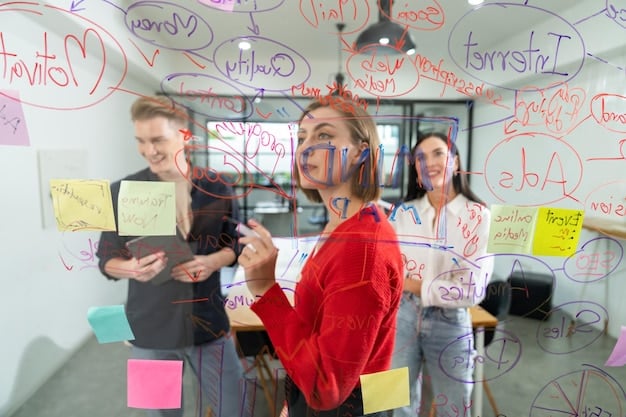Key Skills Employers Seek in 2025 Graduates: Your Essential Guide

Anúncios
Navigating the evolving job market, 2025 graduates must possess a blend of digital literacy, critical thinking, adaptability, and strong communication skills, as these are increasingly prioritized by employers for modern workplace success and innovation.
Anúncios
As the landscape of work continually transforms, understanding what are the key skills employers are looking for in 2025 graduates? becomes not just a curiosity, but a strategic imperative. This guide delves into the crucial competencies that will set graduates apart in a competitive and rapidly evolving professional world.
The Evolving Landscape of Graduate Employment
The job market for graduates is in constant flux, shaped by technological advancements, global economic shifts, and evolving societal demands. What was once considered a niche skill might now be foundational, and entirely new competencies emerge almost annually. Employers aren’t just looking for academic credentials; they’re seeking proactive individuals who can adapt and contribute immediately.
Traditional roles are being redefined, and interdisciplinary approaches are gaining prominence. The ability to navigate complexity, embrace change, and continuously learn is paramount. Universities and graduates alike are challenged to keep pace with these rapid transformations, ensuring that education aligns with industry needs.
Anúncios
Technology Integration in Every Role
Pervasive technology means that nearly every role, regardless of its primary function, now requires some level of digital proficiency. This isn’t just about being able to use standard office software; it extends to understanding data, leveraging AI tools, and even basic coding or automation skills. Employers expect graduates to embrace new technologies, rather than being intimidated by them.
- Digital Literacy: Proficiency with collaboration tools, cloud platforms, and data analysis software.
- AI and Automation Awareness: Understanding how AI can augment human capabilities and streamline workflows.
- Cybersecurity Basics: A fundamental awareness of data protection and online safety practices.
- Data Interpretation: Ability to read, understand, and draw insights from various data sets.
The digital fluency expected goes beyond mere usage; it often involves a conceptual understanding of how these tools impact business processes and decision-making. Graduates who can speak the language of technology, even if not developers, hold a significant advantage.
Furthermore, the shift to remote and hybrid work models has amplified the need for asynchronous communication tools and virtual collaboration platforms. Graduates accustomed to these environments from their academic projects will find transitions smoother into professional roles. This foundational digital comfort is non-negotiable for 2025 entrants.
Critical Thinking and Problem-Solving Aptitude
In a world overflowing with information and facing increasingly complex challenges, the ability to think critically and solve problems effectively remains a core demand for employers. Graduates are not expected to have all the answers, but rather the capacity to ask the right questions, analyze situations, and devise innovative solutions.
This skill involves more than just identifying issues; it requires systematic analysis, evaluating evidence, considering multiple perspectives, and then formulating reasoned judgments. Employers value individuals who can go beyond surface-level understanding to unearth root causes and develop sustainable resolutions.
Problem-solving in 2025 goes hand-in-hand with adaptability. As industries shift and new challenges emerge, graduates must be able to pivot their thinking and apply diverse methodologies. This is not about memorizing solutions but mastering the process of inquiry and resolution.

Analytical and Strategic Thinking
Employers seek graduates who can dissect complex problems into manageable components and then reassemble them into a strategic approach. This involves not only analytical rigor but also the foresight to consider potential implications and future trends. Strategic thinking moves beyond the ‘what’ to the ‘why’ and ‘how.’
- Root Cause Analysis: Ability to identify underlying issues, not just symptoms.
- Scenario Planning: Thinking through potential outcomes of different decisions.
- Systematic Approach: Applying structured methodologies to problem identification and resolution.
- Ethical Reasoning: Considering the broader ethical implications of proposed solutions.
In practice, this means graduates should be able to approach real-world business challenges with a methodical mindset, demonstrating how their academic learning translates into practical, impactful solutions. Whether designing a new product or optimizing an existing process, analytical and strategic thinking are crucial.
The emphasis is also on data-driven decision-making. While intuition has its place, employers now expect graduates to back their solutions with evidence, using data to inform their strategies and measure effectiveness. This blend of analytical prowess and strategic foresight makes a graduate truly invaluable.
Adaptability and Resilience in a Dynamic Environment
The pace of change in today’s professional world is unprecedented, making adaptability and resilience non-negotiable skills for graduates. Employers understand that the roles of tomorrow might not even exist today, and therefore, they prioritize candidates who demonstrate a strong capacity to learn new skills, adjust to novel situations, and thrive amidst uncertainty.
Adaptability isn’t merely about accepting change; it’s about actively embracing it and finding ways to turn challenges into opportunities. This involves mental flexibility, intellectual curiosity, and a willingness to step outside one’s comfort zone. Resilient individuals can bounce back from setbacks, learn from failures, and maintain a positive outlook.
The future workforce will likely involve more project-based work, cross-functional teams, and rapid shifts in priorities. Graduates who are agile and robust in their approach will be best positioned for success.
Embracing Continuous Learning
The concept of “lifelong learning” is more pertinent than ever. Graduates are expected to be proactive in acquiring new knowledge and skills throughout their careers, whether through formal training, online courses, or self-directed learning. A growth mindset is highly valued.
- Self-Directed Learning: Proactively seeking out new information and training.
- Openness to Feedback: Actively receiving and incorporating constructive criticism.
- Curiosity: A genuine interest in understanding new concepts and technologies.
- Unlearning/Relearning: The capacity to discard outdated knowledge and embrace new paradigms.
This commitment to continuous learning is a strong indicator of a graduate’s potential for long-term growth and contribution to an organization. Employers are not just hiring for a skill set, but for a learning capacity that can evolve with the business.
Resilience also entails navigating ambiguity. In fast-moving environments, clear instructions might not always be available, and graduates need to be comfortable making decisions with incomplete information, or at least flagging when more input is crucial. This proactive approach to navigating uncertainty distinguishes highly resilient candidates.
Strong Communication and Interpersonal Skills
In an increasingly interconnected and collaborative workplace, effective communication is no longer a soft skill but a hard requirement. Employers are looking for graduates who can articulate ideas clearly, listen actively, influence others persuasively, and build strong relationships across diverse teams and stakeholders.
Communication encompasses both written and verbal forms, ranging from concise email correspondence to compelling presentations and effective negotiation. Interpersonal skills extend to emotional intelligence, conflict resolution, and the ability to foster an inclusive and productive work environment.
Poor communication can lead to misunderstandings, inefficiencies, and strained relationships, making it a critical area of focus for hiring managers.
Effective Collaboration and Teamwork
Most modern work is done in teams, often interdisciplinary and geographically dispersed. Graduates must demonstrate the ability to collaborate effectively, share knowledge, contribute constructively, and navigate team dynamics. This involves striking a balance between individual contribution and collective success.
- Active Listening: Truly understanding others’ perspectives and concerns.
- Conflict Resolution: Addressing disagreements constructively and professionally.
- Cross-Cultural Communication: Adapting communication styles to diverse backgrounds.
- Feedback Delivery: Providing and receiving feedback productively.
Remote and hybrid work models have further emphasized the importance of clear, unambiguous communication. Graduates who can maintain engagement and productivity in virtual settings, using appropriate digital communication channels, will stand out.
Furthermore, the ability to simplify complex information for various audiences is a key differentiator. Whether communicating technical data to a non-technical team or explaining a strategy to leadership, clarity and conciseness are paramount. This involves tailoring the message to the audience’s needs and understanding.
Emotional Intelligence and Self-Management
Beyond cognitive abilities and technical skills, emotional intelligence (EQ) is gaining significant traction as a crucial predictor of workplace success. Employers recognize that graduates with high EQ are better equipped to manage their own emotions, understand and influence others, and navigate social complexities effectively.
Self-management, a key component of EQ, includes attributes like self-awareness, self-regulation, motivation, and time management. These skills enable graduates to maintain productivity, handle stress, and responsibly pursue their goals without constant external supervision.
Organizations are increasingly prioritizing a positive and psychologically safe work environment, and emotionally intelligent individuals contribute significantly to such cultures. They are typically seen as more resilient, empathetic, and effective in leadership roles over time.

Proactivity and Initiative
While self-management ensures an individual stays on track, proactivity elevates performance. Employers want graduates who don’t wait to be told what to do but actively seek out opportunities to contribute, identify potential improvements, and take ownership of tasks and projects. This demonstrates genuine engagement and a desire to add value.
- Goal Setting: Effectively prioritizing and focusing on key objectives.
- Time Management: Efficiently organizing tasks and meeting deadlines.
- Stress Management: Developing healthy coping mechanisms for workplace pressures.
- Self-Motivation: Maintaining drive and enthusiasm even when faced with challenges.
The ability to work autonomously and demonstrate initiative is especially important in hybrid or remote setups, where direct oversight may be less frequent. Graduates who can take charge of their responsibilities and proactively communicate their progress are highly valued.
Furthermore, having an aptitude for ethical decision-making, even in challenging situations, stems from a strong sense of self-awareness and integrity. Graduates who can demonstrate these qualities, alongside their technical and soft skills, present a well-rounded and trustworthy profile to prospective employers.
Innovation and Creativity in Problem-Solving
In a competitive global marketplace, innovation is the lifeblood of progress. Employers are keen to recruit graduates who can bring fresh perspectives, challenge the status quo, and contribute to the development of novel ideas, processes, or solutions. Creativity, therefore, is not confined to artistic fields; it’s a vital component of strategic thinking in every sector.
This skill involves more than just having ‘good ideas’; it’s about the ability to think divergently, connect disparate concepts, and translate abstract thoughts into tangible outcomes. Graduates are expected to not only execute tasks but also to suggest improvements and explore alternative approaches.
The pursuit of innovation often requires a willingness to experiment, accept failure as a learning opportunity, and persist through challenges. These attributes are highly sought after in dynamic organizations.
Design Thinking and User-Centric Approaches
Increasingly, employers are adopting methodologies like Design Thinking, which places the user at the center of innovation. Graduates familiar with these approaches can contribute to developing products and services that truly meet market needs and deliver exceptional experiences.
- Empathy Mapping: Understanding user needs and pain points deeply.
- Ideation: Generating a wide range of creative solutions.
- Prototyping: Creating initial versions of solutions for testing.
- Iterative Development: Continuously refining solutions based on feedback.
This user-centric mindset is critical in an economy driven by customer experience. Graduates who can approach problems from the perspective of the end-user, whether an internal stakeholder or external client, are invaluable assets.
Moreover, the ability to articulate innovative ideas clearly and persuasively, often to interdisciplinary teams, is just as important as the idea itself. Creativity paired with strong communication skills can catalyze impactful change within an organization, driving forward new projects and growth initiatives.
Professionalism and Work Ethic
Fundamentally, employers seek graduates who embody strong professionalism and a consistent work ethic. While technical and soft skills are crucial, they are built upon a foundation of reliability, integrity, and commitment. These qualities ensure that graduates are not only capable but also dependable and trustworthy members of a team.
Professionalism extends to punctuality, adherence to deadlines, respect for colleagues, and appropriate workplace conduct. A strong work ethic implies diligence, dedication, and a willingness to go the extra mile when necessary to achieve organizational goals.
These qualities contribute significantly to a positive work culture and are often the unspoken prerequisites for career progression within any organization, regardless of its industry or size.
Accountability and Responsibility
Taking ownership of one’s work and being accountable for outcomes, both successes and failures, is a hallmark of a professional. Employers value graduates who demonstrate responsibility, admit mistakes, learn from them, and proactively seek ways to rectify them.
- Reliability: Consistently delivering on commitments and meeting expectations.
- Integrity: Upholding ethical standards and honesty in all dealings.
- Attention to Detail: Producing high-quality work with precision.
- Commitment: Dedication to organizational goals and team success.
The ability to receive feedback, particularly constructive criticism, and implement changes reflects high levels of professionalism. Graduates who view feedback as an opportunity for growth rather than a personal attack will integrate more effectively into professional environments.
Ultimately, a strong professional demeanor and a robust work ethic are the bedrock upon which all other skills are effectively leveraged. These attributes ensure that a graduate is not just a skilled individual, but a valuable and integrating member of any professional team.
| Key Skill | Brief Description |
|---|---|
| 💻 Digital Fluency | Proficiency with modern tools, data insight, and digital collaboration platforms. |
| 🧠 Critical Thinking | Ability to analyze problems, evaluate evidence, and devise effective solutions. |
| 🔄 Adaptability & Resilience | Capacity to learn new skills, adjust to change, and recover from setbacks. |
| 🗣️ Communication & EQ | Clear articulation, active listening, strong interpersonal skills, and self-management. |
Frequently Asked Questions About Graduate Skills for 2025
While many skills are crucial, adaptability and a commitment to continuous learning are arguably the most vital. The rapid pace of change means graduates must constantly acquire new knowledge and adjust to evolving workplace demands. This foundational skill enables the development of other necessary competencies throughout their careers.
Graduates can develop these skills through various avenues: internships, volunteer work, relevant coursework, personal projects, and online learning platforms. Practical experience, especially in team-based or problem-solving scenarios, is invaluable. Actively seeking feedback and engaging in self-reflection also contribute significantly to skill development.
Yes, technical skills remain highly important, but their effectiveness is amplified by strong soft skills. Employers seek a blend: individuals who possess the technical expertise to perform tasks, combined with the communication, emotional intelligence, and critical thinking abilities to collaborate, innovate, and adapt effectively within a team and organizational culture.
AI is transforming job roles, making basic digital literacy and an understanding of AI’s capabilities and limitations crucial. Employers are less interested in tasks AI can automate and more in skills like critical thinking, complex problem-solving, creativity, and ethical reasoning, which complement AI tools and are inherently human-centric. The focus shifts to leveraging AI, not being replaced by it.
A balanced approach is often recommended. Graduates should develop a core specialization to offer deep expertise, but also cultivate a broad set of versatile “T-shaped” skills. This combination allows them to contribute meaningfully in their chosen field while remaining adaptable to new challenges and cross-functional collaborations that frequently arise in modern workplaces.
Conclusion
The job market of 2025 demands more than just academic achievement from its graduates; it requires a dynamic blend of technical proficiency, robust soft skills, and an unwavering commitment to lifelong learning. Employers are actively seeking individuals who can not only navigate complex challenges but also contribute to a culture of innovation, collaboration, and continuous improvement. By prioritizing adaptability, critical thinking, emotional intelligence, and strong communication, today’s graduates can confidently step into tomorrow’s professional landscape, equipped to thrive and make meaningful contributions.





